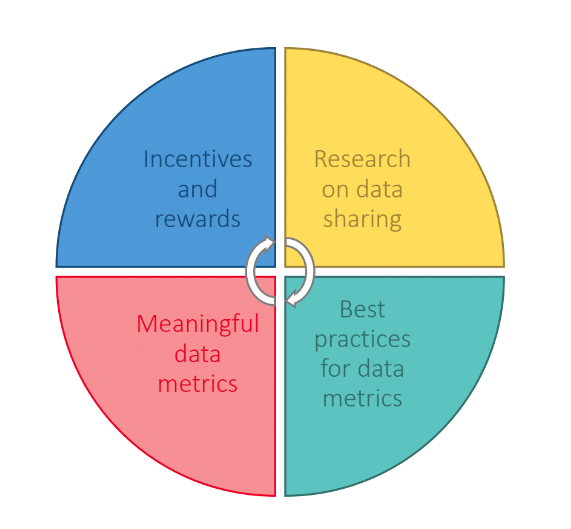ScholCommLab co-director receives funding to analyze patterns of how research data is cited and reused
Stefanie Haustein wins Alfred P. Sloan Foundation research grant of $200K US
Have you ever wondered what motivates researchers to reuse open data and what makes them cite (or not cite) datasets in their work? Or how sharing, reusing and citing open data differs between research areas or changes during a researcher’s career?
ScholCommLab co-director Stefanie was awarded $199,929 US ($281,660 CDN) by the Alfred P. Sloan Foundation to fund Meaningful Data Counts, an interdisciplinary project exploring a range of questions about scholarly data use and citation. Together with co-PI Isabella Peters, Professor of Web Science at the ZBW Leibniz Information Centre for Economics and CAU Kiel University (Germany), Stefanie and her team will conduct the basic research necessary to understand how datasets are viewed, used, cited, and remixed.
“Many researchers have to publish a paper to receive credit for collecting, cleaning, and curating scientific data, because datasets don’t count when applying for a tenure-track job or promotion.”
“Many researchers have to publish a paper to receive credit for collecting, cleaning, and curating scientific data, because datasets don’t count when applying for a tenure-track job or promotion,” Stefanie explains. While an increasing number of journals and funding agencies now require data to be open, research datasets are still considered second-class research contributions. By documenting the uptake and reuse of data across disciplines, she hopes the project will help overcome this perception and incentivize open research practices. “Data metrics that capture dataset views, downloads and citations might help to showcase the value of open data and contribute to elevate its status to first-class scholarly output,” she says.
On the other hand, Stefanie acknowledges that metrics could harm the scientific system in the long run, replicating some of the adverse effects associated with current bibliometric indicators. Therefore, a primary goal of the project is to support the creation of meaningful multidimensional metrics instead of promoting raw numbers and crude rankings. “We want to support the evidence-based development of metrics that are appropriate and well thought-out instead of repeating mistakes of the past by creating more flawed indicators, like the h-index and impact factor,” she explains.

The project team—which, in addition to Stefanie and Isabella, includes collaborators Daniella Lowenberg, Felicity Tayler, Rodrigo Costas, Peter Kraker, Philippe Mongeon, and Nicolas Robinson-Garcia—will therefore take a mixed-methods approach to explore how datasets are (re)used and cited across disciplines. Using metadata provided by DataCite, it will build on ScholCommLab member Asura Enkhbayar’s doctoral research to develop a theory of data citations. As part of the larger Make Data Count (MDC) team, the researchers will work in close collaboration with MDC’s infrastructure and outreach specialists. Also funded by Sloan, this project aims to build a bibliometrics dashboard and drive adoption of standardized practices.
“We are thrilled to expand our Make Data Count team and scope to include the bibliometrics community,” says Daniella Lowenberg, the project’s PI and Data Publishing Product Manager at the California Digital Library. Martin Fenner, Technical Director at DataCite and MDC technical lead, agrees: “Going forward, Stefanie and her colleagues will provide us with important insights into researcher behavior towards open data,” he says. “I am excited to see Make Data Count transition into the next phase.”
During the two-year funding period the grant will support two postdoctoral researchers—one at the University of Ottawa (quantitative) and one at Isabella’s Web Science research group at the ZBW. “I am very happy to join forces with the ScholCommLab and strengthen the German-Canadian research connection,” she says. “After having worked together with Stefanie for more than a decade—we studied together in Düsseldorf—this is our first shared research grant, which is really exciting.”
Stefanie agrees: “There’s a lot of research to be done, but I’m hopeful that, together with MDC, this project will make a real difference in how the scholarly community values open data.”
Interested in learning more? For updates and job postings about the Meaningful Data Counts project, sign up for the ScholCommLab’s newsletter.
1 Comment
Comments are closed.
[…] a bibliometrics dashboard that enables bibliometricians – funded by a separate Sloan grant – to do quantitative studies around data usage and citation […]